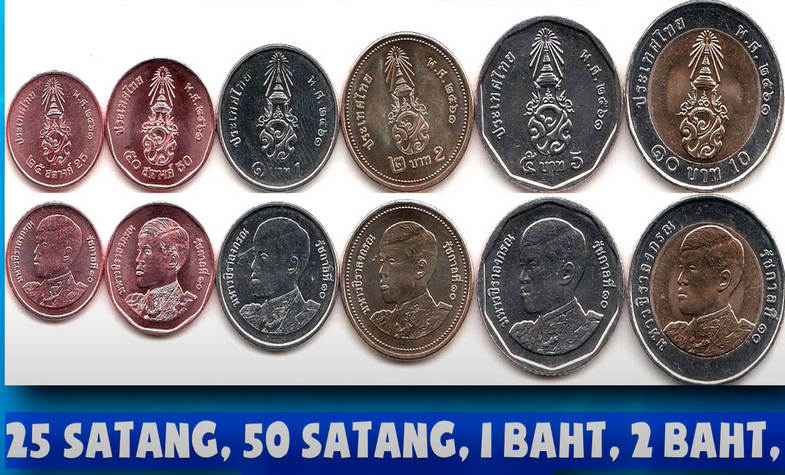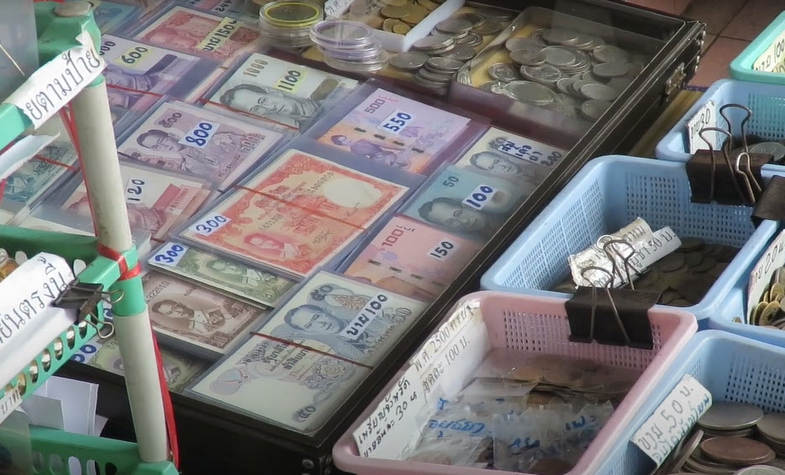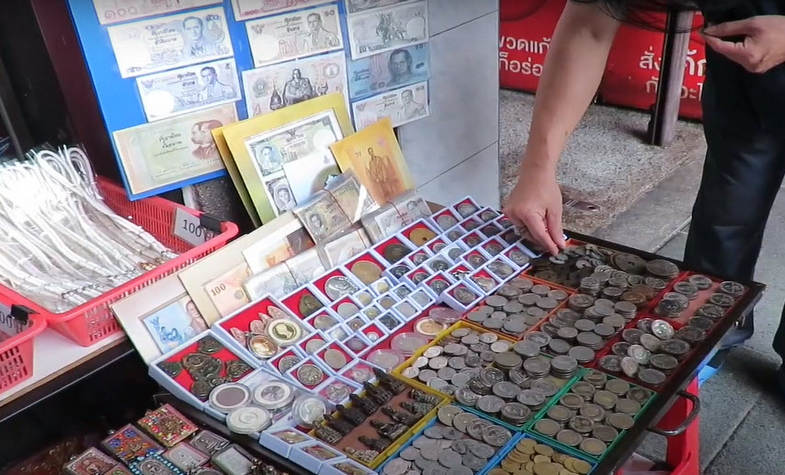Thailand Money Matters: Tips and Tricks for Expats on a Budget
Thailand is a popular destination for expats who want to enjoy its rich culture, beautiful beaches, and friendly people. But before you pack your bags and book your flight, you need to know some important things about money matters in Thailand. How do you get the best exchange rate for your currency? What are the best ways to send and receive money? How do you save on taxes and plan for your retirement? In this guide, we will answer these questions and more to help you manage your finances in Thailand.
Thai Currency
The Baht is Thailand’s official currency. It has 100 satangs as subunits. You can find Baht notes in 20, 50, 100, 500, and 1000 denominations, all with the king’s image. Coins include 10, 5, 2, and 1 Baht. The 2 Baht coin is bigger than the 1 Baht coin and has The Golden Mount on the back. Satang coins are smaller and bronze-colored. They come in 25 and 50 pieces.
Use of money in Thailand
In Thailand all the prices are quoted in Thai Baht and vendors theoretically do not take foreign currencies. Anyway, there are some exceptions in some places but they will be converted the cost of whatever you purchase at a rate of exchange that is favorable for them than the prevailing bank rate. So it is better to change the money before you want to use services or buy anything.
Credit cards are becoming increasingly acceptable in shops, hotels, and restaurants, with Visa being the most useful, followed by MasterCard.

Exchange Money in Thailand
There are foreign exchange booths all over the major tourist areas in Thailand, at all of which you will receive a fair rate of exchange. Most hotels will also change US$ to Baht, but the rate might not be so favorable to you.
Traveler’s checks are changed in banks, which will often require your passport. Rates of exchange at banks or authorized money changers are better than those at hotels and department stores.
When buying Baht, US dollars are the most eagerly accepted currency and it is a good idea to have a supply of travelers' cheques as they receive a better rate than cash. British pounds are the next-best alternative.
There is not a limited total of foreign currency you can bring to Thailand and you can also bring foreign currency to your home country unless the total amount of money you bring is more than the total you mentioned in the customs declaration made when you arrived.
Travelers leaving Thailand may take out no more than 50,000 Thai baht per person in Thai currency.
ATM & Credit Cards
You can use credit cards in many places, but they may charge you 2-3% extra. Your credit card company may also charge you for foreign transactions. Check the exchange rates and fees before you travel.
Credit cards are widely accepted in hotels, restaurants, shops, and online platforms in Thailand. However, using a credit card may incur some fees that can add up quickly. According to Finder1, these are the potential credit card fees in Thailand:
-
Foreign transaction fees. You could pay up to 3% for every transaction you make. That’s $120 fee per $4,000 spent in Thailand.
-
Currency conversion fees. Some merchants may offer to charge you in your home currency instead of Thai Baht. This is called dynamic currency conversion (DCC) and it usually comes with a higher exchange rate and a commission fee. Always choose to pay in Thai Baht to avoid this fee.
-
Cash advance fees. If you use your credit card to withdraw cash from an ATM, you will have to pay a cash advance fee, which is usually a percentage of the amount withdrawn or a flat fee, whichever is higher. You will also have to pay interest on the cash advance from the day you withdraw it until you pay it off in full.
-
ATM fees. The Thai bank that owns the ATM may charge you a fee for using their machine, which is usually around 220 Baht per withdrawal. Your own bank may also charge you a fee for using your card abroad, which could be a flat fee or a percentage of the amount withdrawn.
To avoid or minimize these fees, you should look for a credit card that has no foreign transaction fees, no annual fees, and low cash advance fees and interest rates. You should also compare the exchange rates offered by different credit cards and choose the one that gives you the best value. You should also avoid using your credit card to withdraw cash from ATMs and use other methods instead, such as debit cards or prepaid travel cards.
You can find ATMs all over Thailand, except in very rural areas. They belong to different banks, such as Bangkok Bank, Siam Commercial Bank, Bank of Ayudha, and the Farmers Bank. Most ATMs have an English option. You can use your ATM card or credit card to withdraw cash, but you may have to pay fees to both the Thai bank and your own bank. Find out how much they charge and try to withdraw larger amounts at once.

Cost
Thailand is an inexpensive country to visit thanks to advantageous foreign currency exchanges and an affordable standard of living.
If you are willing to dine at small street stands or markets, you can eat a good meal for less than 60 Baht while it cost around 150 Baht in average restaurants. If you want to stay in comfortable hotels and eat at restaurants, you should increase your budget to around 600.00 - 1000.00 Baht a day outside Bangkok and major tourist hot spots such as Phuket, where you can expect to pay around double. A bottle of water cost around 12-15 Baht, beer around 70-100 Baht, souvenir t-shirt: 200-300 Baht, cinema tickets: 120-170 Baht…
For those with deep pockets, there is no end to the luxury that you can find in Bangkok and a key tourist destination. Bangkok boasts some excellent dining options, top-of-the-range hotels, and shopping opportunities.
Bargaining
Fixed prices are the norm in department stores, but at most other shops bargaining is to be expected. Generally, you can obtain a final figure of between 10-40% lower than the original asking price. Thailand is known as the land of smiles and they value those with a sense of humor and politeness. With a smile on your lips, you can buy goods at a cheaper price!
VAT Refund
Visitors to Thailand on tourist visas can be refunded 7% V.A.T. on goods purchased at registered retail outlets. To qualify for a VAT refund a visitor must purchase must total of at least 2,000 baht per store per day, with a total value of at least 5,000 baht. You must bring your receipt (and passport and flight information) to the VAT Refund counter at the store you purchased goods from on the day you purchased them. At the airport, you must produce these forms as well as the goods to the customs officials at the VAT Refund counter in the departure terminal before passing through customs.

Tipping
Tipping is not compulsory in Thailand, but it is enormously appreciated.
If you're satisfied with the services provided then some tip is applicable. It will encourage the people who take care of your trip to provide excellent service and is an entrenched characteristic of the tourism industry. Below are suggestions for tip per person based on local considerations and feedback from our past travelers:
In local restaurants, if you are a single diner, then a tip of around US$1 is appropriated. It is from 10% to 15% of your bill in the more up-market restaurants. If you are in a group then depends on the group size, a gather of US$4 or 5 is good.
If a service charge of 10 % is already added to your bill then you do not have to tip more but some little change will be appreciated.
For drivers, we suggest US$5 if you are a single traveler and an amount of US$10-15 from the whole group per day can be used.
For your tour guides or group leaders, tipping is much depending on their services. The amount is entirely a personal preference, however, it is US$5-7 per day or US$2-4 per person in a group tour is appropriate.
For sure that tip is not compulsory and you can determine how much you would like to tip for your most appropriate budget basing on your satisfaction with the service and the days you travel.
Maybe you like our Thailand tour:
***
Travel Authentic Asia Company is your best choice for discovering the beauty of Southeast Asia. Our experienced and knowledgeable travel advisors are committed to helping you create a tailor-made tour and extraordinary experiences in this majestic region.
If you're looking for an authentic cultural experience, do not hesitate to contact Travel Authentic Asia to choose a Thailand tour, Southeast Asia tour package or to customize your own style tour to South East Asia.

